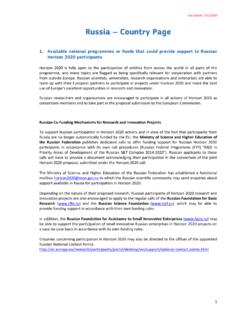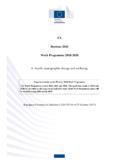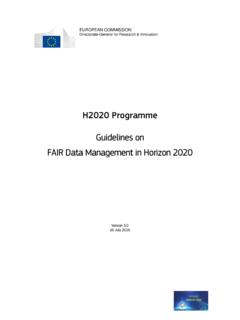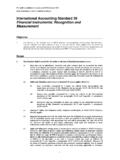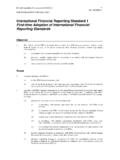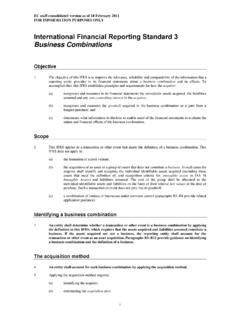Transcription of supplementing Directive 2014/65/EU of the European ...
1 European . COMMISSION. Brussels, C(2016) 2398 final COMMISSION DELEGATED REGULATION (EU) /.. of supplementing Directive 2014/65/EU of the European Parliament and of the Council as regards organisational requirements and operating conditions for investment firms and defined terms for the purposes of that Directive (Text with EEA relevance). EN EN. EXPLANATORY MEMORANDUM. 1. CONTEXT OF THE DELEGATED ACT. General background and objectives Directive 2014/65/EU (commonly referred to as MiFID II') is due to become applicable on 3. January 2017 and, together with Regulation (EU) No 600/2014 (MiFIR), replace Directive 2004/39/EC (MiFID I). MiFID II/MiFIR provide an updated harmonised legal framework governing the requirements applicable to investment firms, regulated markets, data reporting services providers and third country firms providing investment services or activities in the Union. MiFID II/MiFIR aim to enhance the efficiency, resilience and integrity of financial markets, notably by: Achieving greater transparency: introduction of a pre- and post-trade transparency regime for non-equities and strengthening and broadening of the existing equities trade transparency regime.
2 Bringing more trading onto regulated venues: creation of a new category of platforms to trade derivatives and bonds - the Organised Trading Facilities - and of a trading obligation for shares on regulated venues;. Fulfilling the Union's G20 commitments on derivatives: mandatory trading of derivatives on regulated venues, introduction of position limits and reporting requirements for commodity derivatives, broadening the definition of investment firm to capture firms trading commodity derivatives as a financial activity;. Facilitating access to capital for SMEs: introduction of the SME Growth Market label;. Strengthening the protection of investors: enhancement of the rules on inducements, a ban on inducements for independent advice and new product governance rules;. Keeping pace with technological developments: regulating high-frequency trading (HFT) imposing requirements on trading venues and on firms using HFT;. Introducing provisions on non-discriminatory access to trading and post-trading services in trading of financial instruments notably for exchange-traded derivatives.
3 Strengthening and harmonising sanctions and ensuring effective cooperation between the relevant competent authorities. Finally, the overarching aim of the MiFID II/MiFIR regulatory package is to level the playing field in financial markets and to enable them to work for the benefit of the economy, supporting jobs and growth. The present Delegated Regulation aims at specifying, in particular, the rules relating to exemptions, the organisational requirements for investment firms, data reporting services providers, conduct of business obligations in the provision of investment services, the execution of orders on terms most favourable to the client, the handling of client orders, the SME growth markets, the thresholds above which the position reporting obligations apply and the criteria under which the operations of a trading venue in a host Member State could be considered as of substantial importance for the functioning of the securities markets and the protection of the investors.
4 EN 2 EN. Legal background The Delegated Regulation is based on a total of 19 empowerments in MiFID II. This Delegated Regulation should be read together with the MiFID II Delegated Directive and the MiFIR Delegated Regulation. The issue of subsidiarity was covered in the impact assessment for the MiFIDII/MiFIR and the EU's and the Commission's right of action in the impact assessment accompanying these delegated measures. All empowerments on which this Delegated Regulation is based are "shall" empowerments. Some other MiFID II empowerments are for the European Securities and Markets Authority (ESMA) to develop draft Regulatory and Implementing Technical Standards and will be the subject of future delegated or implementing regulations . 2. CONSULTATIONS PRIOR TO THE ADOPTION OF THE ACT. The Commission mandated ESMA to provide it with technical advice on possible delegated acts concerning MiFID II and MiFIR. On 23 April 2014, the Commission services sent a formal request for technical advice (the "Mandate") to ESMA on possible delegated acts and implementing acts concerning MiFID II/MiFIR.
5 On 22 May 2014 ESMA published a consultation paper with regard to its technical advice on delegated acts. ESMA received 330. responses by 1 August 2014. ESMA delivered its technical advice on 19 December 2014. This Delegated Regulation is based on the technical advice provided by ESMA. The Commission services had numerous meetings with various stakeholders to discuss the future level 2 measures throughout 2014 and the first half of 2015. The Commission has also had several exchanges with Members of the ECON Committee of the European Parliament and held several meetings of the relevant expert group, during which the delegated measures were discussed among Member States' experts and involving observers from the European Parliament and ESMA. This consultation process brought a broad consensus on the draft Delegated Regulation. 3. IMPACT ASSESSMENT. The extensive process of consultation described above was complemented by an Impact Assessment report.
6 The Impact Assessment Board delivered a positive opinion on 24 April 2015. Given the number of delegated measures captured by this Delegated Regulation, which covers numerous and technical aspects of MiFID II, the Impact Assessment report does not discuss elements in the Delegated Regulation with limited scope or impact, or elements that have been consensual for a long time in the in-depth consultation process described above. Instead, the Impact Assessment report rather concentrates on the measures with greater impact or scope for Commission choice. In particular, these concern definitions of MiFID II concepts, transparency matters, fees for trade data publication, SME Growth Markets or commodity derivatives. Analysis of costs and benefits The costs of the choices made by the Commission described in the impact assessment fall almost entirely on market participants (trading venues, systematic internalisers, organised trading facilities, SME growth markets, high frequency traders) who will incur costs in setting up trade data publication, in some instances applying for authorisation (in particular for SIs, SME GMs, high frequency traders), for implementing the enhanced organisational and conduct of business rules.
7 The Impact Assessment provided further estimations of the EN 3 EN. compliance costs triggered by the Level 2 provisions. By ensuring a harmonised implementation and application of MiFID II and MiFIR the delegated acts will make sure that the objectives of level 1 can be achieved without imposing inordinate additional burden on stakeholders. Overall, the impacts of the delegated acts are relatively minor as the scope of possible action has already been determined in MiFID II and MiFIR level 1 texts. The benefits concern investment firms and other entities subject to MiFID II/MiFIR. requirements but also investors and society more widely. This includes the benefits from increased market integration, efficient and transparent financial markets, enhanced competition and availability of services and increased investor protection. The suggested measures should make financial markets more transparent and more secure and improve investor confidence and participation in financial markets.
8 In addition, by contributing to fostering orderly markets and reducing systemic risks, these measures should improve the stability and reliability of financial markets. The investment plan for Europe highlights reducing fragmentation in the financial markets and contributing to enhanced and more diversified supply of finance to SMEs and long-term projects as key elements of the strategy to improve the framework conditions for growth. Financial markets are one of the most important channels for the optimal allocation of capital within the European economy. However, capital will only flow frictionless if financial markets are stable and trusted by all market participants. A clearly defined legal framework will therefore help to achieve the Commission's top priority to get Europe growing again. These benefits are considered to considerably outweigh the costs. There is no effect on the EU budget. Proportionality The need for proportionality is reaffirmed in several provisions and duly taken into account across all of the Delegated Regulation.
9 For instance, requirements in the area of organisational aspects reflect proportionality concerns. In elaborating definitions such as systematic internalisers, high frequency trading, foreign exchange 'other derivatives contracts, the need for proportionality was duly respected in the calibration of quantitative and qualitative thresholds. 4. LEGAL ELEMENTS OF THE DELEGATED ACT. Chapter I: Scope and definitions This chapter sets out subject matter and scope and include definitions in relation to the concept of incidental manner for the purposes of the exemption concerning investment services provided in an incidental manner in the course of another professional activity;. commodity derivatives, including wholesale energy products that must be physically settled, energy derivatives contracts and wholesale energy products, other derivative financial instruments, derivatives under section C(10) of Annex I to Directive 2014/65/EU ;. the circumstances under which other derivative contracts relating to currencies should be considered financial instruments as well as the meaning of spot contracts for currencies, and specifies a delineation of financial contracts and contracts used to effect payments.
10 Investment advice;. EN 4 EN. trade transparency and market structure rules, including further specification of money-market instruments and definition of systematic internalisers in relation to equity and non-equity instruments, trading controls, including further specifications on algorithmic trading, high frequency algorithmic trading technique and direct electronic access Chapter II: Organisational requirements The Chapter specifies organisational requirements for investment firms performing investment services and ancillary services. In particular, it addresses procedures with regard to matters such as the compliance function, risk management, complaints handling, personal transactions, outsourcing and conflicts of interest, including the additional organisational requirements for underwriting and placing services and the production and dissemination of investment research. Chapter III: Operating conditions for investment firms The Chapter sets out the rules with which an investment firm has to comply when providing investment services or ancillary services to its clients.
